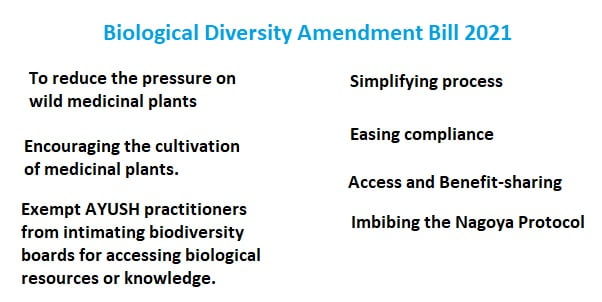Biological Diversity Amendment Bill 2021
Context:
Recently, the Biological Diversity Amendment Bill 2021 was tabled in the Parliament.
Contents
Key Highlights of Biological Diversity Amendment Bill:
- The Bill, once passed by the Parliament, would amend the Biological Diversity Act, 2002.
- The said Act seeks to fulfil India’s obligations under the Convention of Biological Diversity and Nagoya Protocol.
- The Bill seeks to reduce the pressure on wild medicinal plants by encouraging the cultivation of medicinal plants.
- The Bill proposes to exempt AYUSH practitioners from intimating biodiversity boards for accessing biological resources or knowledge.
- The Bill also facilitates fast-tracking of research, simplify the patent application process, decriminalises certain offences.
- The Bill brings more foreign investments in biological resources, research, patent and commercial utilisation, without compromising the national interest.
- The bill focuses on regulating who can access biological resources and knowledge and how access will be monitored.
- The Bill has also clarified and strengthened the role of state biodiversity boards.
- Decriminalising of offences: Violations of the law related to access to biological resources and benefit-sharing with communities, which are currently treated as criminal offences and are non-bailable, have been proposed to be made civil offences.
Why we Need for the Biological Diversity Amendment Bill?
- Simplifying process: Ayush medical, seed, industrial, and research sectors have all expressed concerns about the procedure, urging the government to simplify and speed it.
- Easing compliance: They asked the government to lower the compliance burden in order to create a favourable climate for collaborative research and investment.
- Access and Benefit-sharing: It also aimed to simplify the patent application procedure, as well as expand the extent of access and benefit-sharing with local communities.
- Exemptions: Ayush practitioners have been exempted from the Act’s scope, which is a significant step because the Ayush business relies heavily on India’s biological resources.
- Certain offences: Violations of the law relating to benefit-sharing with communities, which are now recognised as criminal offences and are not punishable by imprisonment, have been proposed to be changed to civil offences.
- Imbibing the Nagoya Protocol: This measure aims to align domestic legislation with the 2010 Nayogya Protocol on ABS’s free prior informed consent requirements
Criticisms of the Biological Diversity Amendment Bill 2021
- No consultation: The bill has been introduced without seeking public comments as required under the pre-legislative consultative policy.
- No profit-sharing: There are ambiguous provisions in the proposed amendment to protect, conserve or increase the stake of local communities in the sustainable use and conservation of biodiversity.
- Commercialization: Activists say that the amendments were done to “solely benefit” the AYUSH Ministry.
- Loopholes to Biopiracy: The Bill would mean AYUSH manufacturing companies would no longer need to take approvals.
- Ignoring Bio-utilization: The bill has excluded the term Bio-utilization which is an important element in the Act. Leaving out bio utilization would leave out an array of activities like characterization, incentivisation and bioassay which are undertaken with commercial motive.
- Exotic plants cultivation: The bill also exempts cultivated medicinal plants from the purview of the Act but it is practically impossible to detect which plants are cultivated and which are from the wild.
- De-licensing: This provision could allow large companies to evade the requirement for prior approval or share the benefit with local communities.
Way Forward
- Effective Implementation of the Forest Rights Act (FRA): The government must make an effort to build trust between its agencies in the area and the people who depend on these forests by treating them as equal citizens like everyone else in the country..
- The FRA’s loopholes have already been identified; all it needs is to work on amending it.
- Integration of International Treaties: The implementation of Nagoya Protocol cannot work in isolation and thus must be commensurate with other international treaties.
- Therefore, integration between Nagoya Protocol and the International Treaty on Plant Genetic Resources for Food and Agriculture (ITPGRFA) need to consider the legislative, administrative and policy measures that cross each other’s path
- People’s Biodiversity Register (PBR): PBR should aim to document folk knowledge of status, uses, history, ongoing changes and forces driving changes in biodiversity resources, and people’s perceptions of how these resources should be managed.
- PBRs can be useful to preserve the rights of farmers or communities over the traditional knowledge they may hold over a particular variety.
Source: Indian Express
You can find many articles on ACTS AND AMENDMENTS (part of GS II) and ENVIRONMENT (part of GS III) in our website. Go through these articles share with your friends and post your views in comment section.
Discover more from Simplified UPSC
Subscribe to get the latest posts sent to your email.



